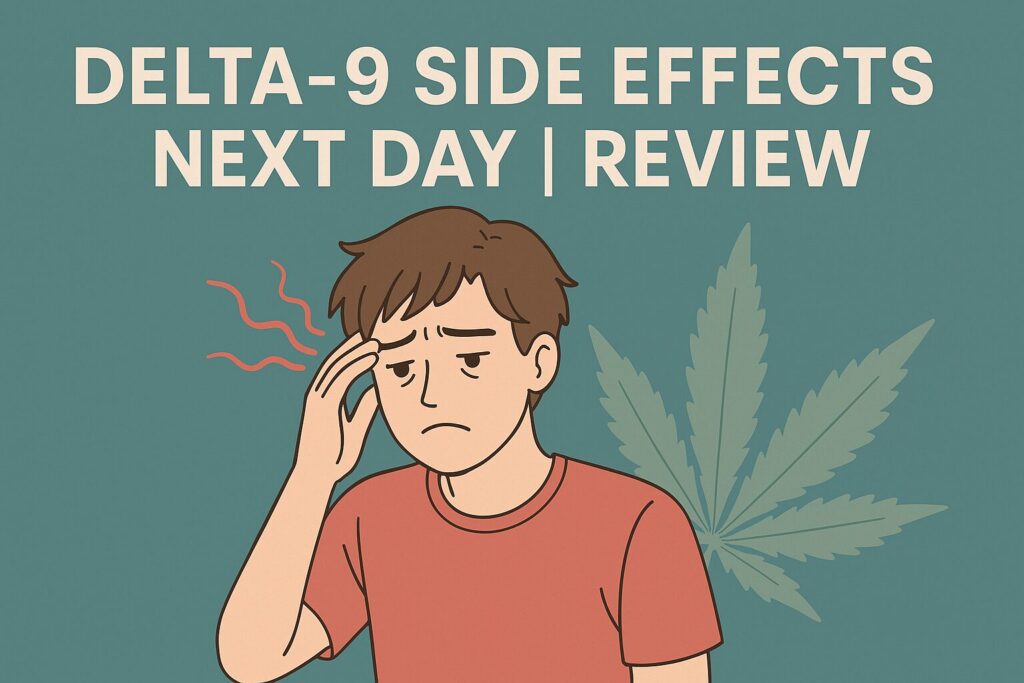Delta-9-tetrahydrocannabinol (Delta-9 THC) is the primary psychoactive compound found in cannabis. It’s what gives users the “high” feeling when they consume marijuana or hemp-derived products. Delta-9 interacts with the body’s endocannabinoid system, particularly the CB1 receptors in the brain, leading to altered perception, mood changes, and sometimes physical effects.
While its immediate impact is well known—euphoria, relaxation, increased appetite—the next-day effects of Delta-9 THC are not discussed as often but are equally important, especially for new users or those with sensitivities.
Why People Use Delta-9 THC
Delta-9 is commonly consumed for both recreational and medicinal purposes. Here’s why people turn to it:
-
Pain Relief: Many patients use Delta-9 to ease chronic pain.
-
Stress and Anxiety Reduction: It helps users relax and unwind.
-
Sleep Aid: People struggling with insomnia often find relief with THC.
-
Appetite Stimulation: Particularly helpful for those undergoing treatments like chemotherapy.
-
Recreational Use: Some enjoy the euphoric and sensory effects it brings.
However, the aftermath—the next day—can come with side effects that need to be acknowledged.
How Delta-9 Affects the Brain and Body
Delta-9 works by mimicking natural neurotransmitters. It binds to cannabinoid receptors and affects how neurons communicate. This results in:
-
Altered sensory perception
-
Mood swings
-
Drowsiness or sedation
-
Cognitive delays
Depending on dosage and individual tolerance, these effects can linger into the next day.
Common Next-Day Side Effects of Delta-9
You might feel fine after using Delta-9, but the next day can bring subtle or even uncomfortable symptoms. Some of the most commonly reported effects include:
1. Brain Fog
Users often report mental haziness the following morning. Tasks that require concentration or critical thinking may feel more difficult. Brain fog may last a few hours but can disrupt work or school performance.
2. Fatigue and Low Energy
Delta-9 is known to induce sleep, but the quality of sleep may be affected. Even after 7-8 hours, people often wake up feeling sluggish, tired, or unmotivated. This grogginess may be due to how the body metabolizes THC.
3. Dehydration and Dry Mouth
Also known as “cottonmouth,” dehydration from Delta-9 can linger into the next day, leaving you with a dry throat, bad breath, or headache. Staying hydrated is key to avoiding this side effect.
4. Anxiety or Paranoia
For some users, Delta-9 brings rebound anxiety. While it may initially calm nerves, some individuals experience heightened anxiety or irritability the next morning.
5. Digestive Issues
The munchies may feel good in the moment, but overindulgence in junk food or overeating can cause bloating, indigestion, or stomach discomfort the next day.
6. Headaches
A Delta-9-induced headache the next day can come from dehydration, poor sleep, or overstimulation of the brain’s receptors. Mild to moderate headaches are common, especially with higher doses.
7. Coordination and Motor Skills Impairment
Even after the high fades, motor coordination and balance can be slightly off the next day, especially if the Delta-9 was consumed in edible form (which lasts longer).
8. Mood Swings or Emotional Numbness
Some users report feeling emotionally flat or even moody the following day. This might result from a dopamine dip after the euphoric high wears off.
Factors That Influence Next-Day Side Effects
Not everyone experiences these effects. Several variables can influence whether and how you feel Delta-9 side effects the next day:
-
Dosage: Higher doses increase the likelihood of lingering effects.
-
Method of Consumption: Edibles stay longer in the body than smoking or vaping.
-
Individual Tolerance: Frequent users may build tolerance, while new users feel effects more strongly.
-
Metabolism: A slow metabolism can result in longer retention of THC.
-
Sleep Quality: Disrupted REM cycles due to THC may cause grogginess.
-
Hydration and Nutrition: Poor hydration or unhealthy food intake intensifies symptoms.
Comparing Delta-9 With Other Cannabinoids
How does Delta-9 compare to other cannabinoids like Delta-8 or CBD when it comes to next-day effects?
-
Delta-8 THC: Milder than Delta-9, Delta-8 is less likely to cause brain fog or next-day grogginess.
-
CBD: Known for its calming and anti-inflammatory properties, CBD doesn’t cause any psychoactive effects or next-day side effects.
-
THC-O or HHC: These newer cannabinoids are much stronger than Delta-9 and can produce even more pronounced next-day effects.
Delta-9 sits in the middle of the spectrum—stronger than Delta-8, gentler than THC-O.
Long-Term Use and Its Accumulative Side Effects
While occasional Delta-9 use may bring temporary next-day effects, regular consumption can lead to chronic aftereffects such as:
-
Memory problems
-
Increased tolerance (requiring higher doses)
-
Dependence or withdrawal symptoms
-
Changes in sleep architecture
-
Emotional numbness or decreased motivation (a.k.a. “amotivational syndrome”)
Understanding the long-term risks is essential for responsible use.
Can You Avoid Next-Day Delta-9 Side Effects?
Yes, by being mindful, you can reduce or avoid unwanted aftereffects. Here are a few practical tips:
-
Start Low, Go Slow: Especially with edibles, always begin with the smallest dose.
-
Stay Hydrated: Drink water before, during, and after using Delta-9.
-
Eat Clean: Avoid heavy or greasy food while under the influence.
-
Use Earlier in the Day: Give your body time to metabolize THC before bedtime.
-
Supplement With CBD: CBD can counteract some of Delta-9’s side effects.
-
Prioritize Sleep Hygiene: Sleep in a cool, dark room and avoid screen time before bed.
-
Avoid Mixing With Alcohol: Combining substances can increase toxicity and lead to worse hangovers.
Who Should Be Cautious With Delta-9?
Certain groups are more likely to experience intense or prolonged next-day side effects, including:
-
First-time users
-
Individuals with anxiety disorders
-
People with liver or kidney conditions
-
Those on medications (like antidepressants)
-
Teenagers and young adults
-
Elderly individuals
Always consult a healthcare provider if you’re unsure about THC’s interactions with medications or pre-existing conditions.
Real User Reviews: What People Say About Next-Day Effects
Let’s take a look at what real users report:
“I felt amazing last night, but I couldn’t focus at work today. It’s like my brain is moving slower.”
— Reddit User
“Woke up feeling like I had a hangover—dry mouth, foggy head, and zero energy.”
— Trustpilot Review
“I use Delta-9 for back pain. It helps me sleep, but I definitely feel a bit groggy in the morning.”
— Medical Marijuana Forum User
“Edibles wreck me for two days. I stick to vaping now.”
— Facebook Group Comment
Most reviews highlight brain fog, tiredness, and slight mood changes the next day, especially with edibles and high doses.
The Role of Tolerance in Managing Side Effects
Your body’s tolerance to Delta-9 plays a major role in whether you experience next-day effects. Higher tolerance often means:
-
Shorter high
-
Fewer lingering effects
-
Need for larger doses to feel the same effects
However, increasing your dose too frequently can backfire and lead to stronger hangover-like symptoms. Consider tolerance breaks (T-breaks) to reset your body and reduce next-day impacts.
Is a Delta-9 Hangover Real?
While not officially recognized by the medical community, many users describe what they call a “weed hangover.” Symptoms include:
-
Lethargy
-
Mild nausea
-
Dry eyes
-
Mental sluggishness
-
Lack of motivation
Though milder than alcohol hangovers, they are real for some and should not be dismissed.
When to Seek Medical Attention
Most next-day side effects are harmless and temporary, but in rare cases, you should seek medical attention if you experience:
-
Intense chest pain
-
Panic attacks that won’t subside
-
Shortness of breath
-
Severe vomiting or dehydration
-
Hallucinations or loss of consciousness
These are signs of an extreme reaction, possibly due to high potency or a contaminated product.
Alternatives to Delta-9 With Fewer Next-Day Effects
If next-day symptoms are too bothersome, consider switching to:
-
CBD-only products for relaxation without the high
-
Delta-8 or CBG for mood balance and pain relief
-
Non-cannabinoid supplements like melatonin for sleep
You can still benefit from cannabis without the downsides of Delta-9.
Final Thoughts:
Delta-9 THC is a powerful compound that affects everyone differently. While many people enjoy its benefits, others struggle with lingering side effects the next day.
By understanding your body, managing your dose, and staying hydrated and well-rested, you can minimize the impact and enjoy Delta-9 more responsibly.
Like any substance, awareness is key. Know your limits, listen to your body, and if something feels off, don’t ignore it.


